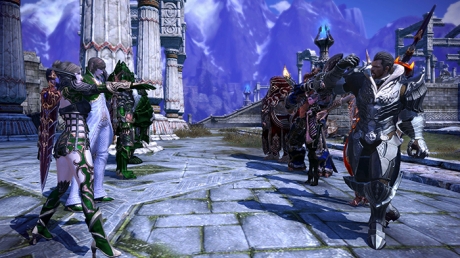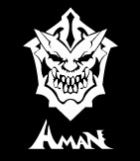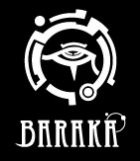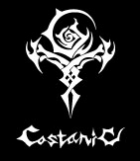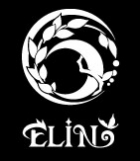TERA is a MMORPG with standard MMO features such as questing, crafting, and PvP action with a real-time battle system. The game features an action role-playing game combat style, where skill, position, timing, and aim determine success in combat.
About a millennia ago two omnipotent titans Arun and Shara entered into formless voids and fell asleep. The titans started to dream of a world that took form on their backs known as Tera. New creatures took place called mortals. They were forced into the divine wars of the gods, which eventually left the gods dead, imprisoned, or otherwise diminished. With the gods gone, the seven races must now band together to fend off a new enemy.
Character Creation
Like most MMOs, before the player begins to play they must first create a character. Players start by selecting a race and class before changing individual features of the character's appearance with sliders.
Races
There are currently seven available races, each with their own unique abilities that make them unique from one another:
|
| No Stranger to Pain When under 30% HP, all damage taken is reduced by 10%. |
| Blood of Dragons Resistance to DoT effects is increased by 10. | |
|
| Gather No Moss Innate baraka determination increases their resistance to immobility by 10. |
| Indefatigable Baraka stamina does not fall below 20% while adventuring. | |
|
| Dirty Fighting Castanics have an increased critical hit chance on attacks from behind. |
| Light Landing Castanics take 50% less falling damage. | |
|
| Friendly Current An elin swims faster than other races. Certain dungeon and field maps have areas where swimming is the best way to get around. |
| Botanist An elin character gathers plants faster than other races. | |
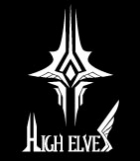 | Core Infusion Once every two hours, an elf can completely replenish their MP. |
| Resilience of Mind After resurrecting, an elf continually regenerates MP for a time. | |
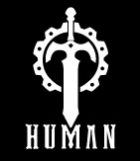 | Resilience of Body Humans continuously heal HP after being resurrected. |
| Indomitable Spirit Humans take less PvP damage when under 30% HP. | |
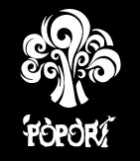 | Horizon Run Once every 30 minutes, a popori can increase its non-combat speed by 20 for 3 minutes. |
| Soothing Presence Once an hour, a popori can reduce movement speed by 40% to move freely past aggressive monsters for 1 minute. |
Classes
There are eight classes to choose from, each with their unqiue fighting styles with advantages and disadvantages:
Archer - The archer is a highly mobile, ranged dps class. By channeling energy into the bow, the archer is capable of a wide range of attacks, dealing massive burst or rapid damage to foes.
Berserker - Berserkers use charge-up attacks to deal massive damage. They can also block incoming frontal attacks, though they lose MP quickly when not attacking.
Lancer - A lancer is a heavily armored fighter focused on anchoring a battle. Generates maximum threat with shouts and special attacks, sacrificing movement and attack power for the best durability in the game.
Mystic - Mystics are a strong support class with skills to protect and enhance their party through buffs and auras. They also summon mighty thralls to assist, heal, and aid them in battle.
Priest - The priest is a robed magic user whose primary role is to restore health and vitality. However, a priest is not to be taken lightly - the same power that revives allies can also smite foes.
Slayer - A lightly armored, agile fighter with a devastating greatsword. High damage attacks combine with evasive maneuvers for a dynamic combat style.
Sorcerer - The sorcerer is a ranged damage class focused on annihilating the enemy with high-damage "nuke" attacks. The mobile artillery of TERA.
Warrior - Quick attacks and high mobility make a warrior essential to group play, but also very survivable while soloing. Tanking with this class is difficult, but possible. If you're choosing a warrior to be a tank, be prepared for a challenge.
Combat
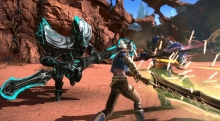 The combat is designed to be fluid and more realistic, with a real-time battle combat system that uses a third-person camera view. Targeting is done through a cross-hair reticule rather than a locking on system, allowing players to actively dodge enemy attacks.
The combat is designed to be fluid and more realistic, with a real-time battle combat system that uses a third-person camera view. Targeting is done through a cross-hair reticule rather than a locking on system, allowing players to actively dodge enemy attacks.
To add to the realistic combat, players hit chance is directly influenced by the size of the enemy and different sized enemies require different approaches. Depending on the class, combat can be about brute force or a matter of strategically finding weak points in the enemy's defense.
Dungeons
Both the story quests and general exploration will lead to players exploring multiple dungeons, typically intended to be explored with a 5 person team. These, as well as the quests inside, will yield item and XP rewards.
Equipment
Equipment is made up of Armor, Weapons and Jewelry. Each piece has a unique gear level, with two pieces of the same type and tier not always having the same values. The average of all the gear generates a gear score.
Crafting equipment can only be done after finding or buying recipes as the player progress, with higher-level recipes requiring hard-to-find runes and accessories.
Additionally, some quests and monsters offer award tokens. These can be exchanged for armor, weapons, and consumable items at specialty vendors in major cities. This equipment can have a set selection of abilities or may be enchantable.
Armor
Armor is the first defense against any threat and there are multiple types from light defense to heavy defense. They can be found, quested, crafted or bought and is ordered in grades, with each grade covering a 5 level range.
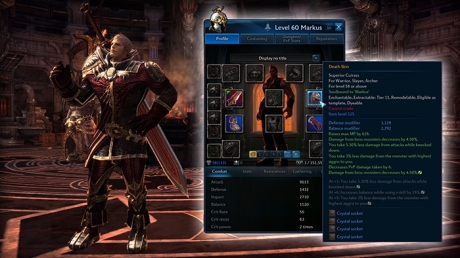
All armor has base abilities that make them unique and better for certain occasions:
- The Defense Modifier is the second most effective way to reduce damage. The higher this value, the less damage you will take.
- The Balance Modifier helps in combat by preventing knocked down. The higher the balance stat, the better chances of not getting knocked down.
- Additional MP armor pieces increases the player's maximum MP.
Weapons
Weapons come in tiers, and a higher tier means a more powerful weapon. Each class has a unique weapon type that can be bought, quested, or dropped from an enemy.
No matter the stats, players should never equip a lower tier weapon than the one they're using, but that doesn't mean they should always upgrade straight away.
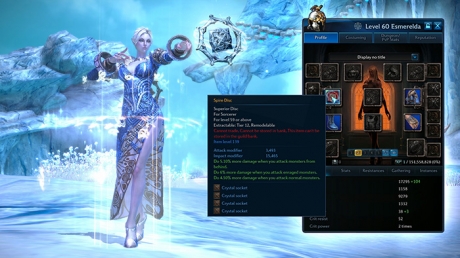
Weapons have three universal characteristics, no matter which class uses them:
- The Attack Modifier determines how much base damage is done. The weapon adds significantly to this total.
- The Impact Modifier determines the likelihood of putting an opponent on the ground while fighting.
- Additional MP weapons increases the player's maximum MP.
Jewelry
Jewelry has no crafting skill, but necklaces, rings, and earrings also modify a character's stats in the same way as weapons and armor.
- Necklaces and Rings have Attack Modifier, Impact Modifier, and Additional MP stats.
- Earrings have Defense Modifier, Balance Modifier, and Additional HP.
Customizing Gear
In order to allow players to customize gear, allowing for varied play styles when using the same class, TERA has a system for adding additional stats, enchanting, and changing the look of gear.
Crystals
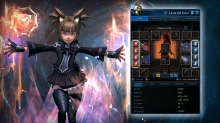 In addition to the generic equipment stats, TERA offers the ability to change the stats of weapons and armor through Crystals. These items, gained as quest rewards, item drops, or purchasable from vendors, can grant extra HP or MP, increased defense, or any number of special effects. Each weapon or armor has a number of crystal slots available, but if the player dies in combat, there's a chance for one or more crystals to shatter.
In addition to the generic equipment stats, TERA offers the ability to change the stats of weapons and armor through Crystals. These items, gained as quest rewards, item drops, or purchasable from vendors, can grant extra HP or MP, increased defense, or any number of special effects. Each weapon or armor has a number of crystal slots available, but if the player dies in combat, there's a chance for one or more crystals to shatter.
Enchanting
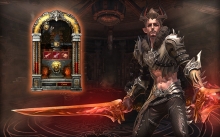 In some cases a player will come across "primed" weapons. Through enchnating, players can improve their weapons with even more power.
In some cases a player will come across "primed" weapons. Through enchnating, players can improve their weapons with even more power.
There are three things that are required for this process: an item to enchant, an item to sacrifice, and Alkahest. In general, the better the item and the enchantment, the smaller the chance to succeed the enchantment. However, if failed, the game provides a small bonus for better chances on subsiquent enchantments.
Remodeling and Dyeing
Remodeling allows the player to change the look of armor or weapons. This can be done by using a template or the design of another item they already own.
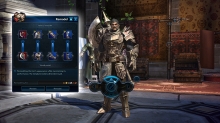
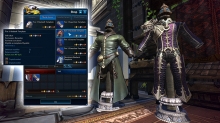
Dyeing is for all types of armor as long as it's dyeable. In order to do this, the item a player wants to change must have in it's description the word "dyeable".
Glyphs
Glyphs help by improving a player's skills. At level 20, players receive 10 available glyph slots and then gain a new slot with every subsequent level. Some glyphs will take only one slot, while others will take more. Finding a balance between the utility and the space they occupy so the character will have a maximum benefit from them is the key to glyphs.
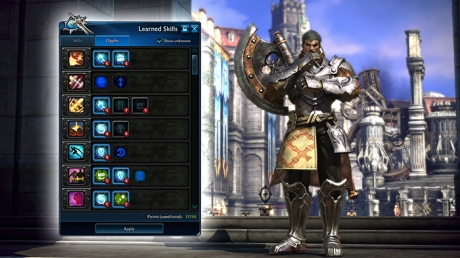
There are four types of glyphs:
Restorative Glyphs - Help recover health and mana, either in discrete bursts or over time.
Empowering Glyphs - Make a skill better, whether by increasing the number of targets, extending the range or duration of a skill, or simply decreasing cast times or MP costs.
Defensive Glyphs - Increase resistance, endurance, and movement speed.
Offensive Glyphs - Increase power, add damage to existing skills, and improve the critical rate and attack speed.
Crafting
Crafting allows players to create any kind of equipment they like, though not all items can be crafted right away. Players will need to gain a selection of patterns, either through vendors or monster drops, have the correct skill level, and the required raw materials, refining kits, weapon kits, armor kits, or alchemical kits.
There are six crafting abilities:
Weaponsmithing: Creates the heavy weapons for the heavy armor classes.
Focus Crafting: Creates the remaining weapons for the light armor classes.
Armorsmithing: Creates the heavy armor from refined ingots.
Leatherworking: Creates the medium armor from hides for the DPS classes.
Tailoring: Creates the light armor from cloth for the mage classes.
Alchemy: Creates consumable items like potions, scrolls, and dyes that can aid in adventuring or make them look good while doing it.
Trade Brokers
Every town or city has at least one trade broker, but all of them are linked together in a network. Like auction houses, these brokers allow players to list their items for sale to everyone on the server or search for and buy items listed by others.
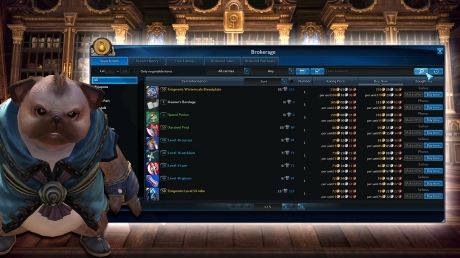
Pets
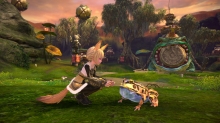 The pets are personal companions. They will help on the field by auto-looting or, if they have a pet pocket, they can carry the retrieved items.
The pets are personal companions. They will help on the field by auto-looting or, if they have a pet pocket, they can carry the retrieved items.
Pets consume energy when out on the field and require players to tend to them frequently with food. Pet Treats can be purchased at any general merchant to restore 30% of your pet’s energy or Pet Food from Valkyon Outfitters to replenish 100% in one morsel.
PvP
PvP combat is common in MMORPGs, with some players enjoying the ability to have friendly skirmishes with others. There are four major types of PvP challeneges that you can offer other players:
- Duels are fast 1-on-1 battles that end when a player reaches 1 HP, rather than death.
- Player Kills are only available on PvP servers and is gained at level 11, when you gain the skill to declare yourself an "outlaw." This allows you to attack any other play over level 11, but can also result in you being attacked.
- Deathmatchs are team battles that can be held anywhere and have no area or zone restrictions. You can put your money at risk and bet gold and items while battling 10 versus 10, or 5 versus 1.
- Guild vs Guild are 24 hour matches that are server-wide. Only a guild leader can start a battle, but it will take every member doing their part to finish one.
